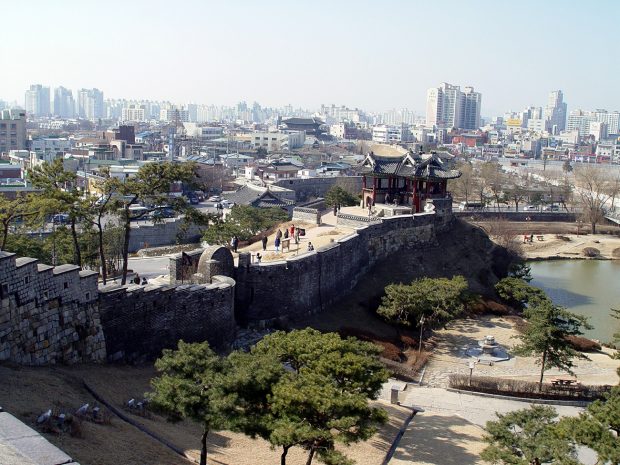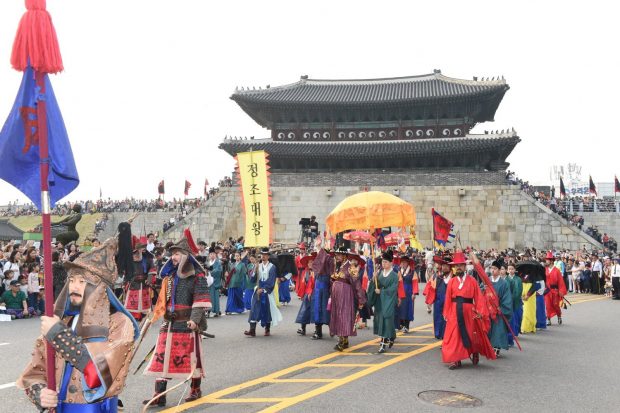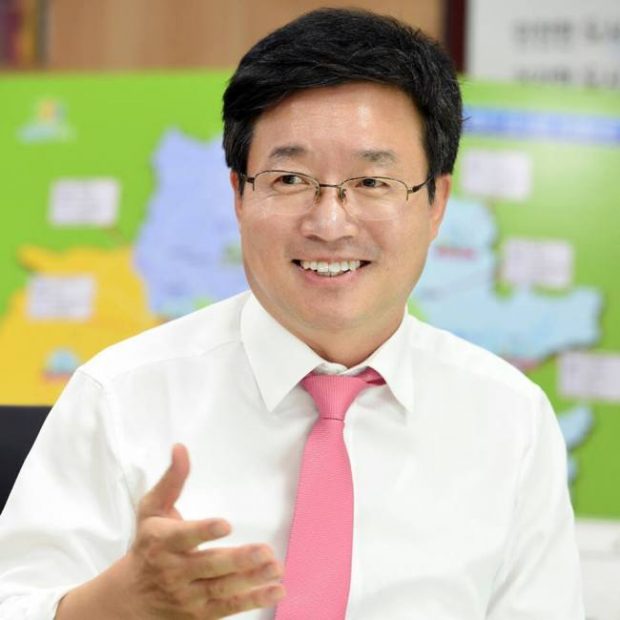South Korea’s Suwon, a special fusion of old and new, puts people at center of all policies

Hwaseong Third North Secret Gate and Dongbuk Gangnu (Intelligent Community Forum)
By Habib Toumi
SUWON: Showcasing an astonishing and harmonious fusion of old and new, Suwon rightly claims special fame as a historical landmark and the biggest city in the province of Gyeonggi.
The centrally-located city where UNESCO World Heritage-listed treasures and royal relics co-exist with a modern skyline asserts itself as one of its kind in South Korea.
Located in the southern section of the Korean capital, Seoul, Suwon Hwaseong has both military defenses and commercial, scientific, practical and logistical functions.
Suwon Hwaseong was built based on the filial devotion of Seoul’s 18th-century ruler, King Jeongjo who constructed the fortress as a military stronghold and shrine to his late father. It was also built on the grand ambition to root out partisan politics and promote royal politics.
The original shape of the fortress has been preserved, becoming a sanctuary for architecture and centuries-old traditions. The street network that used to connect Paldalmun, Janganmun, Hwaseonghaenggung and Changryongmun still maintains the major frameworks of the city, preserving the shape of the fortress as it was 200 years ago and making it
As the construction purpose was more to emphasize filial piety and its political and economic aspects than to pursue military purposes, Suwon Hwaseong is well preserved as a fortress that holds cultural, emotional and philosophical values. Suwon Hwaseong Fortress was registered on the UNESCO World Heritage List in 1997.
Today, Suwon is home to both tradition and cutting-edge industries, including global company Samsung Electronics. More than two million people live in the city.
For Mayor Yeom Tae-young, Suwon should be “a sustainable city with the goal of creating a nature-friendly human-centered city.”
“We have been doing our best to create ‘a people-friendly human city’ and ‘people-oriented bigger Suwon’,” he said.
“Suwon City puts ‘people’ at the center of all policies and sees solutions for all issues in ‘solidarity and cooperation’ while trying to develop in a sustainable manner.”
Yeom has since his first election as the Mayor of Suwon in 2010, introduced numerous initiatives to boost citizen’s participation in the administrative process and the incorporation of their views into the city’s budgeting process, urban policies and judiciary proceedings.
In 3017, he pushed the communities to engage in shaping the city’s various economic, environment and welfare policies to enable Suwon to devise a policy that meets the real demands of the residents.
“We shouldn’t forget that our sense of responsibility for the people’s rights and our sense of solidarity for the community is a stepping stone for a strong democracy,” he told a Korean daily.
Major features of Suwon:

Suwon Hwaseong Cultural Festival (Twitter)
Suwon Hwaseong Cultural Festival
The most famous cultural festival of Suwon is held in October. The cultural tourism festival combines tradition and modernity with events that effectively reproduce scenes of history with themes of Suwon Hwaseong Fortress. This festival, the largest of its kind in Korea, attracts about 800,000 visitors.
Suwon Ballet Festival
This annual event has been co-organized with Ballet STP Cooperative since 2015. With a rich content that features a one-day class for kids, flash mob, moving ballet exhibition and performance by amateur ballet dancers, Suwon Ballet Festival welcomes citizens’ participation.
Suwon Theater Festival
Every May, Suwon Theater Festival presents beautiful and exciting plays, music, performances, and street art to citizens as the largest performance arts festival in Suwon. In 2019, six teams from overseas and 11 Korean teams participated in the festival.
Suwon Jazz Festival
Every September, the Suwon Jazz Festival, held in the “Fun Field” in Gwanggyo Lake Park, presents unforgettable performances to the audience with sweet melody of jazz music and the beautiful night view of the lake park.
Suwon Cultural Night
On an August evening with cool breeze, citizens enjoy the view of Suwon Hwaseong Fortress and Haenggung decorated with media art and listen to stories of history and culture as they walk along the fortress wall.
Suwon Hwaseong Museum
Suwon Hwaseong Museum provides information on the construction of Suwon Hwaseong Fortress, an architecture from Joseon Dynasty and the source of pride for Koreans.
Haewoojae, Toilet Culture Exhibit Hall
This exhibition hall presents the philosophy and belief of the late former Mayor Sim Jae-deok, who brought about a revolution in public toilet in Korea and around the world.
Suwon GwangGyo Museum
This museum exhibits artifacts excavated in the development of Gwanggyo New Town and information on how the city was changed. It has a special exhibition hall with donated historical records, and exhibits the artifacts donated by two historical figures, Mr. Lee Jong-hak and Min Gwan-sik.
Suwon Museum
Suwon Museum consists of “Suwon History Museum”, which presents the rich history and culture of the city, and “Korea Calligraphy Museum”, which helps visitors understand the history of calligraphy in Korea.
National Map Museum
It is the only museum specialized in maps in Korea, operated by the National Geographic Information Institute, an organization responsible for creating maps of Korea. Visitors can find old maps of Korea, equipment for mapping, and models of measurement facilities.
Suwon Convention Center
Suwon Convention Center opened in May 2019, and has two underground floors and five aboveground floors. It is equipped with exhibition hall (7,877㎡), convention hall (3,040㎡), and 28 meeting rooms (3,779㎡).
Suwon SK Atrium
Home to Suwon Philharmonic Orchestra and Suwon Civic Chorale, the SK Atrium supports various performances and culture & art education programs for citizens with the best stage system and performance environment. It serves as a space for creative art where citizens can communicate and artists and audience can develop together.
Suwon IPark Museum of Art
Located in front of Hwaseong Haenggung, this first art museum of Suwon City has halls for exhibition project, education, and curation, as well as a cafeteria and museum lounge. The IPark Museum of Art serves as a place for citizens to enjoy culture and art and provides visitors with an opportunity to enjoy high-quality art.
Suwon Outdoor Concert Hall 1
This building won the Korean Architecture Award in 1996, and is the largest outdoor concert hall in Korea. It is a popular place for citizens of Suwon to enjoy culture outdoors thanks to good acoustics anywhere in the large grass field.
Suwon Outdoor Concert Hall 2
This small-sized outdoor performance hall is located in Manseok Park. This hall is also a cultural hub of North Suwon and hosts various outdoor cultural events. Culture classes are also held in this place.
Gosaek Newseum
The wastewater treatment facility located in Suwon Industrial Complex had been an idle space until it was redeveloped into a cultural complex for community members and businesses in the industrial complex. With new cultural facilities, the Gosaek Newseum is becoming a hub for culture and art in West Suwon.
International Sister Cities: 18 cities in 14 countries – 10 cities in Asia: Asahikawa, Fukui (Japan), Jinan, Hangzhou, Zhuhai (China) Bandung (Indonesia), Hai Duong (Vietnam), Siem Reap (Cambodia) Kaohsiung, and Hyderabad (India), one in Oceania: Townsville (Australia), one in the Middle East, Yalova (Turkey), three in Europe: Nizhny Novgorod (Russia), Cluj-Napoca (Romania), and Freiburg (Germany), two cities in the Americas: Toluca (Mexico) and Curitiba (Brazil), and one in Africa: Fez (Morocco)
Suwon has made an impressive presence in international sports. In 2002, the Suwon World Cup Stadium, nicknamed Big Bird because the roof of the stadium resembles a bird spreading its wings, hosted four FIFA World Cup matches.
The city is also where world soccer player Park, Ji-sung, who played for Manchester United and PSV Eindhoven, grew up.

Suwon Mayor Yeom Tae-young (Suwon City)
YEOM Tae-young, Mayor of Suwon City
B.S. in Agricultural Chemistry, Seoul National University
Professional Environmental Engineer
Current Posts:
– 5th~7th Popularly Elected Mayor, Suwon City, Republic of Korea
(Jul. 2010 ~)
– Supreme Council Member, Democratic Party of Korea (Aug. 2020 ~)
– Chair, National Association of Mayors of Korea (Jul. 2019 ~)
– Member, OECD Champion Mayors (Oct. 2017 ~)
– Member, Global Executive Committee, ICLEI – Local Governments for
Sustainability (Sep. 2010 ~)
– Member, Executive Committee, CityNet (local governments’ association in the
Asia Pacific Region) (Jan. 2018 ~)
– Cochair, National Action for Constitutional Amendment on Decentralization (Oct. 2012 ~)
– President, World Toilet Association (Nov. 2013 ~)
– Member, Presidential Committee on Balanced National Development (Jul 2019 ~)
– Cochair, Forum ‘Self-governance and Balance’ (Jun. 2020 ~)
– Standing Chair, Korea Democratic Leadership Council for Autonomy
Decentralization (KDLC) (Jun. 2020 ~)
Past Posts
– Employee, Samsung C&T Corporation
– Co-representative and Secretary General, Suwon Environmental Movement
Center
– Founding Secretary General(concurrently with Secretary General), Local
Substantiality Alliance of Korea
– Secretary to the President of Korea for National Agenda for Roh Moohyun
Administration (Jan. 2005 ~ Feb. 2006)
– Standing Auditor, Korea National Park Service
– Member, Presidential Advisory Commission on Policy Planning
(2007 ~ 2008)
– Member, Presidential Committee on Jobs (2017 ~ 2019)
– Vice Spokesperson, Democratic Party of Korea (2010)
– Chair, World Heritage Cities Conference (Nov. 2010 ~ Oct. 2012)
– Chair, National Association of Municipal Mayors, Democratic Party of Korea (Jul. 2017 ~ Jul. 2018)
– Standing Chair, Local Governments Association for Town Creation (Sep. 2015 ~ Oct. 2018).

























































